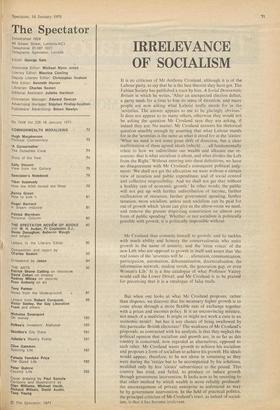IRRELEVANCE OF SOCIALISM
It is no criticism of Mr Anthony Crosland, although it is of the Labour party, to say that he is the best theorist they have got. The Fabian Society has published a tract by him, A Social Democratic Britain in which he writes, 'After an unexpected election defeat, a party tends for a time to lose its sense of direction; and many people are now asking what Labour really stands for in the 'seventies. The answer appears to me to be glaringly obvious.' It does not appear so to many others, otherwise they would not be asking the question Mr Crosland says they are asking, if indeed they are. No matter. Mr Crosland answers his rhetorical question sensibly enough by asserting that what Labour stands for in the 'seventies is the same as what it stood for in the 'sixties: `What we need is not some great shift of direction, but a clear reaffirmation of these agreed ideals [which] ... all fundamentally relate to how we redistribute our wealth and allocate our re- sources: that is what socialism is about, and what divides the Left from the Right.' Without entering into these definitions, we have no disagreement with Mr Crosland's consequent political judg- ment: 'We shall not get the allocation we want without a certain view of taxation and public expenditure, and of social control and collective responsibility. And we shall not get that without a healthy rate of economic growth.' in other words, the public will not put up with further redistribution of income, further reallocation of resources, further government spending, further taxation, more socialism, unless such socialism can be paid for out of growth which 'alone can give us the elbow-room we need, and remove the present dispiriting constriction on almost any form of public spending'. Whether or not socialism is politically possible with growth, it is politically impossible without.
Mr Crosland thus commits himself to growth; and he tackles with much ability and honesty the conservationists who resist growth in the name of amenity, and the 'siren voices' of the new Left who are opposed to growth in itself and assert that 'the real issues of the 'seventies will be .. , alienation, communication, participation, automation, dehumanisation, decentralisation, the information network. student revolt, the generation gap, or even Women's Lib.' It is a fine catalogue of what Professor Vaizey would call the Lower Drivel; and Mr Crosland is to be praised for perceiving that it is a catalogue of false trails.
But when one looks at what Mr Crosland proposes, rather than disposes. we discover that his necessary higher growth is to come about through a more flexible rate of exchange together with a prices and incomes policy. It is an unconvincing mixture, not much of a medicine. It might or might not work a cure in an economic model: but has it any chance of being swallowed by this particular British electorate? The weakness of Mr Crosland's proposals, as contrasted with his analysis, is that they neglect, the political opinion that ,socialism and growth arc, in so far as this country is concerned, now regarded as alternatives, opposed to each other. Mr Crosland wants growth to achieve his socialism and proposes a form of socialism to achieve his growth. His ideals would appear, therefore, to be not alone in remaining as they were during the 'sixties but to be accompanied by his solutions, modified only by less 'sixties' subservience to the pound. This country has tried, and failed, to .produce or induce growth through government intervention. It looks now to be resorting to that other method by which wealth is more reliably produced: the encouragement of private enterprise as unfettered as may be by government intervention. In the field of practical politics, the principal criticism of Mr Crosland's tract, as indeed of social- ism, is that it has become irrelevant.










































 Previous page
Previous page